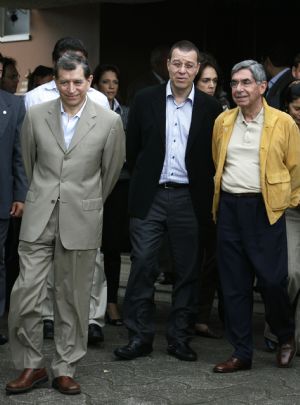Lopez also described Micheletti's government, which no nation or multilateral organization has yet recognized, as "constitutional" and said those who think otherwise were interfering in Honduras' sovereign decisions.
Responding to Lopez's remarks, Rixi Moncada, who led Zelaya's delegation, said her team was unable to continue the talks because Micheletti's government had failed to respect the international community's wishes.
Earlier in the day, Aristedes Mejia, another member of Zelaya's team, said all topics that could be discussed were secondary to Zelaya's return.
Analysts said the two sides were unlikely to reach an agreement in a near term as neither side was showing any flexibility in their arguments.
The post-coup government has soon been in power for a month, and would have to function without any public international recognition, they said.
After the talks collapsed, Zelaya said returning to Honduras to fight for his presidency remained an option.
"Absolutely no one can stop me (from returning). I'm a Honduran. It is my right," he told media over the telephone from Nicaragua, Honduras' southern neighbor.
Zelaya's previous attempt to fly home on July 5 by a Venezuelan aircraft was thwarted by Honduran troops, who prevented the plane from landing in Tegucigalpa, capital of the Central American nation.
The ousted president said he was preparing a series of alternatives that could be by air, land or sea.
"We have democracy in Honduras. I'd like to ask the other presidents of Europe and Latin America how they would feel to be tied up and thrown out. What would they do?" he said.
In Honduras, Zelaya's supporters continued to protest against Micheletti, blocking highways and holding rallies in eight of the nation's population centers.
 |
|
Costa Rica's President Oscar Arias (R) walks next to Carlos Lopez (L), representative for Honduras' interim President Roberto Micheletti, and Aristedes Mejia (C), representative for deposed Honduran President Manuel Zelaya, after negotiations in San Jose July 19, 2009. Zelaya and his rival failed to strike a deal on Sunday to solve the country's political crisis after two days of talks.[Xinhua]
|
Besides Arias' fear of a civil war in Honduras, there are also concerns about what could happen if a military government takes root in the region.
Pablo Monsanto, a former guerilla leader in Guatemala, warned that more coups could occur in Latin America if the Honduras coup survived.
"There is a risk that other coups will occur in Latin America," he told local media in Guatemala City.
Armed rebel movements were not appropriate for the new democratic trend in the region, but were now a real fact that would have to be faced in the wake of a post-coup government that repressed its population by force, said Monsanto, a signatory to Guatemala's 1996 Peace Accords.
(Xinhua News Agency July 20, 2009)